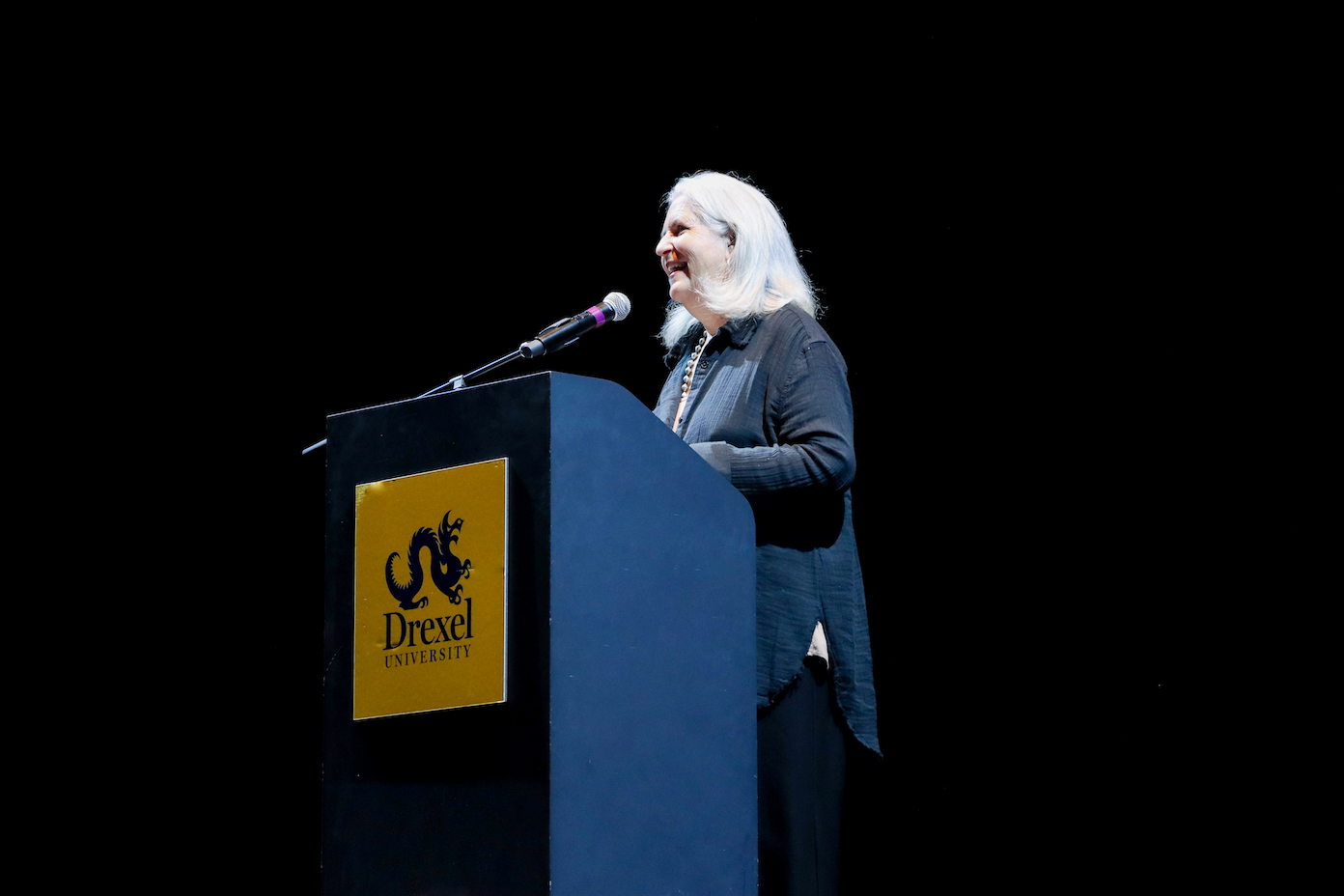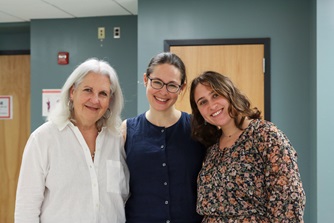Finding Beauty in a Broken World with Terry Tempest Williams
By Sarah Hojsak

Terry Tempest Williams | Photo by Liz Waldie
April 14, 2023
How do we find beauty in a world that often feels like it’s fractured beyond repair—socially, politically and environmentally? How can we transform grief and despair into hope, or something even stronger?
On April 6, the College of Arts and Sciences welcomed author and environmentalist Terry Tempest Williams to Drexel to deliver our 10th Annual Distinguished Lecture. Her wide-ranging talk, titled “Finding Beauty in a Broken World: From Erosion to an Ethic of Place,” was tied together with the thread of community.
 Williams (left) with Assistant Professor of Sociology Amanda McMillan Lequieu, PhD, and English major Alexa Dersovitz | Photo by Liz Waldie
Williams (left) with Assistant Professor of Sociology Amanda McMillan Lequieu, PhD, and English major Alexa Dersovitz | Photo by Liz Waldie
Ahead of her lecture, Williams led an intimate masterclass for students and faculty at the Academy of Natural Sciences, providing a glimpse into her writing process and demonstrating how coming together as a community can lead to powerful conversation.
“I am a teacher and a researcher interested in people’s stories of place, so I was keen to connect with Terry through the masterclass,” said Assistant Professor of Sociology Amanda McMillan Lequieu, PhD. Williams’ first book, “Refuge: An Unnatural History of Family and Place,” has been influential to McMillan Lequieu in her own writing and research as an environmental sociologist.
“Terry has a way of talking about grief, loss and pain—both physical (in the body) and of the heart—that still holds space for love,” McMillan Lequieu explained. “It is this fullness of the human experience that I try to capture in my own work.
“Finding Beauty in a Broken World” is both the title of Williams’ 2009 book and the name of a course she has taught as a writer-in-residence at Harvard Divinity School. It’s also an idea she has explored through writing and advocacy in a career spanning more than four decades.
Williams’ lifelong love of nature was sparked when her grandmother gave her a field guide to Western birds. Rooted in the landscape of the American West, her work is deeply personal while illuminating the environmental and social issues we all face and showing us how intertwined they are. “Finding beauty in a broken world is creating beauty in the world we find,” Williams reiterated throughout her lecture.
She began her talk by reflecting on how the past three years have led to a time of reckoning in the United States, which Williams describes as an ecological, political and spiritual crisis. When climate change reached her home state of Utah in the form of destructive fires, she was asked to write an “obituary for the land.” She read from the resulting essay, “A Burning Testament.”
“To the power of these burning, illuminated western lands who have shaped our character, inspired our souls, and restored our belief in what is beautiful and enduring—I will never write your obituary—because even as you burn, you are throwing down seeds that will sprout and flower, trees will grow, and forests will rise again as living testaments to how one survives change.”
As a writer, Williams explained, it can be painful to bear witness to what she sees happening around her in the land she holds so dear. Yet she regards it as an obligation, because writing is her gift. Each of us has a gift, Williams tells us. We must ask ourselves what our gifts are, and how we can use them to help the greater good.
When she was asked by The New York Times to write about Utah’s Great Salt Lake, she didn’t want to focus on the science of the drought-stricken lake, nor the fraught politics and history surrounding it. Instead, in William’s essay, “I Am Haunted by What I Have Seen at Great Salt Lake,” the lake takes on a life of its own as she channels her love and grief for the dying lake. It becomes a sovereign body, one with which she hopes readers will empathize.
“This is where I place my faith—in our collective capacity to mobilize love. If we can shift our view of Great Salt Lake from a lake to be avoided to a lake we cherish; from a body of wasted water to an ancient body of wisdom; not to exploit, dam, and dike, but to honor and respect as a sovereign body, our relationship and actions toward the lake will be transformative.”
Williams talked about the “weather reports” she has led at Harvard, where writers, scientists, activists and more come together to share their unique perspectives on this moment in time. In these conversations, she said, despair and hopelessness have given way to solutions-oriented ideas and organized activism. As people from different walks of life sit together and listen to each other's stories, strength and a sense of community emerge.
Like Williams’ students at Harvard, McMillan Lequieu’s students in Sociology of the Environment have felt climate grief—a sense of existential loss due to climate change. “At the masterclass, Terry and I talked about how this grief can sap hope and turn into cynicism,” McMillan Lequieu reflected. “But it can also motivate engagement—engagement, she told me, is stronger than hope.”
As we think more deeply about our relationship to the earth, Williams calls upon us to consider how we can put our gifts to use: “May each of us locate our gifts. May each of us ask that question, how can I help? And may each of us find something deeper than hope where we can act on behalf of a beautiful broken world.”